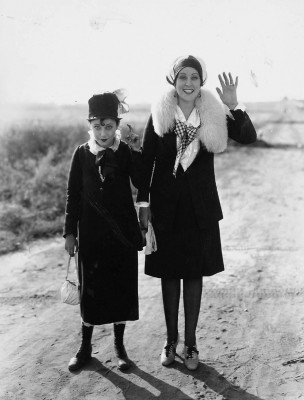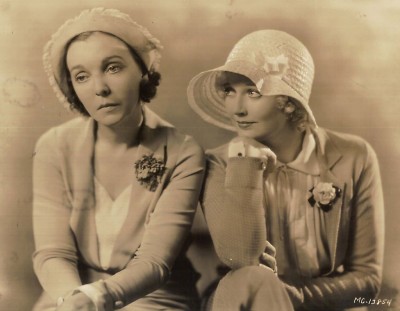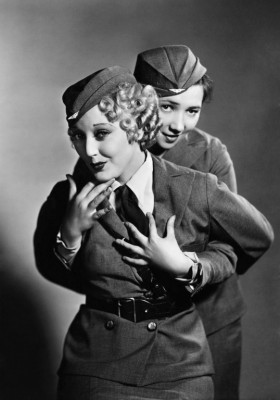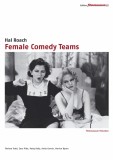| Reviews & Columns |
|
Reviews DVD TV on DVD Blu-ray 4K UHD International DVDs In Theaters Reviews by Studio Video Games Features Collector Series DVDs Easter Egg Database Interviews DVD Talk Radio Feature Articles Columns Anime Talk DVD Savant Horror DVDs The M.O.D. Squad Art House HD Talk Silent DVD
|
DVD Talk Forum |
|
|
| Resources |
|
DVD Price Search Customer Service #'s RCE Info Links |
|
Columns
|
|
|
(Hal Roach) Female Comedy Teams
Of course, Laurel & Hardy were Roach's big moneymakers, and obviously his original idea was to essentially create a female version of that team. Over time, however, the personality-driven nature of these films moved them in different and interesting directions. The weakest shorts in this set are no worse than pleasant and the best ones are outstanding. The picture quality is also quite good, overall slightly better than the excellent Laurel & Hardy DVD boxed sets released in Europe, and all but one of the shorts retains its original MGM opening titles. Supplements include an excellent booklet and DVD-ROM with wonderful stills and expanded versions of several of the booklet essays.
Byron & Garvin
Note: All of these shorts are new to DVD
Feed 'Em and Weep (1928)
Before Todd and Pitts there was the somewhat awkward pairing of Anita Garvin and Marion "Peanuts" Byron. Garvin was a frequent foil in Laurel & Hardy's universe, appearing in 11 of their films from the silent days through 1940's A Chump at Oxford (in the long version of that film only). In her prime Garvin was an extraordinarily sexy vamp-type; tall, leggy, and curvy with slicked-back jet-black hair. Byron, a good foot shorter than Garvin, was Buster Keaton's leading lady in Steamboat Bill, Jr. (1928) but even though I watched that and this nearly back-to-back I didn't make the connection. Here, in the patsy role, Byron's make-up and performance - a wide-eyed, childlike pixie -less resembles Stan Laurel than another silent clown: Harry Langdon. This short, with good musical accompaniment, follows Anita and Marion's short-lived and disastrous assignment as waitresses at a whistle-stop café owned by Max Davidson, who's a kind of Jewish Gabby Hayes.
(Reader Steve Haynes notes Davidson, "had a short-lived starring series at Roach in the last days of the silent era. The shorts are attmitedly stereotypical, but so amiable it's hard to take offense. The best of these is very good indeed and Pass the Gravy, the story of two neighbors, their engaged children, and a prize-winning rooster named Brigham, is as good as any two-reel comedy ever made. Film Museumm has just released a similarly packaged 2-DVD set of all the extant Davidson shorts. I just got mine a few days ago and have seen enough to feel comforatable recommending it. It's PAL, but not region coded.")
The short is incomplete, pieced together from 35mm and 16mm elements, though only a minute or two seem to be missing, and that's adequately reconstructed using stills and intertitles. It's reasonably funny but the chemistry between Garvin and Byron is practically nil. Though real Mutt 'n Jeff types physically, Garvin's merely bossy while Byron stares blankly. There's all of the conflict but none of the warmth of Laurel & Hardy, or even the slightest suggestion of camaraderie. (*** out of *****)
A Pair of Tights (1929)
A vast improvement over Feed 'Em and Weep, this short wisely directs Anita Garvin's steely-eyed glower away from Marion Byron and toward cheapskate date Edgar Kennedy. (Here, strong-willed Garvin is quite amusing instead of merely irritable.) Byron, paired off with Stuart Erwin, is less extreme, more down to earth and feminine; her repeated failed efforts to get four ice cream cones from the parlor to Erwin's illegally parked car is wonderfully funny, building nicely. Writer-supervisor Leo McCarey, soon to move on to bigger and better things, may be chiefly responsible for this short's intelligent and appealing reworking of the Garvin-Byron team. (McCarey is widely credited with teaming, defining and crystallizing the partnership of Laurel & Hardy.) Kennedy, barely recognizable as the train conductor in Feed 'Em and Weep, has a better role here, as does Roach perennial Charlie Hall, who play a chef in the former and a fender-bender victim in this. Stealing the film though is Ellinor Vanderveer as the dowager-type who sits on four wayward ice cream cones; her reaction is priceless. So good is this short that most of it wound up in Robert Youngston's When Comedy Was King (1960). Silent with optional musical score. (**** 1/2)
Pitts & Todd
The Pajama Party (1931)
Studio head Hal Roach personally directed this third of 17 ZaSu Pitts-Thelma Todd shorts, and it reflects his long-term ambitions to beef-up productions in a move toward feature films. It's big if rather silly and features several musical numbers. The girls are run off the road and straight into a lake (Echo Park, perhaps?) by society matron Mrs. Van Dyke (Elizabeth Forrester). She invites them into her nearby mansion to dry off, change clothes, and join the big party downstairs. Most of the short's laughs are rooted in their unfamiliarity with things like butlers and French chambermaids. (When one addresses Thelma in French she, trying to be nonchalant, responds in Pig Latin.) The film has a peculiar attitude toward the idle rich, who behave like unruly children and indulge themselves in childish pranks. Like other Roach-supervised shorts, this has some strange concepts about comedy. As one of the butlers, Billy Gilbert affects the worst British accent this side of Keanu Reeves. Todd and Pitts are already firmly established in their characters, with Todd the effervescent free-spirit not above using her sex appeal to get ahead, while the Olive Oyl-like, slightly addle-brained Pitts** is the bemused old maid. (***)
On the Loose (1931)
A huge improvement over The Pajama Party, in this short Thelma and ZaSu are fed up repeatedly spending Saturdays - their one day off - on dates with men that invariably take them to Coney Island. There's a wonderful scene near the beginning where the girls, sharing a bed in those Great Depression-era times, giggle about old dates and the "stripes" they've earned: all manner of tshatshke won at the arcade. Later, when a sedan splatters mud on the girls' clothes its wealthy young driver (John Loder) insists on buying the girls a new wardrobe at Pierre's (Billy Gilbert, uncharacteristically billed as "William Gilbert"). Gilbert is hilarious as the inarticulate, very gay dress shop manager, with the punch line being that he's not gay at all, but merely feigning his feyness for the benefit of his rich customers. Loder also insists upon taking the girls on a date, somewhere "very smart and frightfully original": Coney Island. I don't know where the amusement park scenes were filmed (anybody?) but they offer a fascinating glimpse at the kind of rides and attractions that existed in the early-1930s, and feature some ambitious hand-held camerawork. (An amusing musical motif is a hilariously grating calliope rendition of "Sonny Boy," repeated ad nauseum.) Oh, and there's a charming unbilled cameo appearance by a well-known comedy team at the end. (*****)
Show Business (1932)
Three Stooges fans take note: This Pitts-Todd short would be remade almost gag-for-gag four years later with Moe, Larry, and Curly as A Pain in the Pullman. Jules White directed the Todd-Pitts version and produced the Three Stooges remake over at Columbia with Jules's bother Jack (as Preston Black) taking sole writing credit. The remake is better - in fact it's one of the Stooges' all-time best shorts - but this makes fascinating viewing. Jobless Vaudevillians reduced to eating apples for dinner, Thelma and ZaSu get a last-minute call from booking agents Goldstein, Goldblatt, Goldwaite & O'Brien. A very stereotyped Jewish man with an enormous hooked nose and thick Yiddish accent comes on the line, "O'Brien speaking." (Politically incorrect humor, where hast thou gone?) "Pitts & Todd 'and' The Musical Monk," possibly the same primate later seen in A Pain in the Pullman (but definitely the same one in Keaton's The Cameraman), race to the station to catch their train. There, they encounter an insufferable prima donna (Anita Garvin, in the role played by James C. Morton in the remake) with Monte Collins as her manager (reworked as a conductor ["John-son!"] and subsequently played by Bud Jamison). Roach regular Charlie Hall turns up as the drunk that, in a stupor, tries to cut the monkey's tail with a pair of shears. Garvin's a treat here; unhappy at the full-page ad taken out with her name in 40-point type she rants that it might be good enough for the likes of Swanson or Garbo, "but not for Garvin!" White adds a few uncharacteristic (for Roach) head-collision-type sound effects later perfected on his Stooge shorts, while Thelma Todd spends half the film in various states of pre-Code undress. And there's yet another classic comedy connection. One of the blondes on the train is an unbilled Paulette Goddard, later Mrs. Charlie Chaplin and his co-star in Modern Times and The Great Dictator. (****)
Asleep in the Feet (1933)
This short is noteworthy mainly for its Depression-era verisimilitude. ZaSu and Thelma sneak food into their small apartment, whose fierce landlady (Kay Lavelle) has a strict no-cooking-in-the-rooms policy. Their next-door neighbor faces eviction over $20 in back rent, while across the hall streetwise Anita Garvin suggests the girls earn some extra money as taxi dancers, "dime-a-dance" hostesses getting tickets from customers for a turn around the floor. As later films like The Lady in Red addressed more explicitly, some of the less reputable dance halls were actually thinly-disguised brothels, and in this pre-Code release there're more double-entendres than you can shake a stick at, so to speak. When ZaSu notices one particularly sweaty dame with an armload of tickets she exclaims, "She must have broke her back for that!" One of the more graceful male dancers on the floor strongly resembles and might well be an unbilled Charley Chase (or, less likely, his director brother, James Parrott). It certainly wouldn't have been out of character for a big Roach star to lend support and talent on another's short. The film ends on an unexpectedly sweet note, nicely demonstrating both Thelma and ZaSu's warm friendship and their appealing kindness to others. (*** 1/2)
The Bargain of the Century (1933)
A fairly routine two-reeler, I suspect this was included because the great Charley Chase directed it, and he definitely puts his stamp on the material. Thelma, madly driving through town in a teeny car (the same one from Laurel & Hardy's Our Wife?), is stopped by motorcycle cop Officer Butterworth (James P. Burtis). She talks him out of a ticket by claiming ZaSu is the police captain's daughter, and further convinces him to join them on their mad dash to a department store sale. Butterworth loses his job, but ZaSu's chance encounter with Captain Smaltz (Billy Gilbert) becomes a golden opportunity to get the cop's job back. I'd love to know where the wild car chase was filmed. At one point the car actually whizzes through a tight pedestrian underpass. (***)
Todd & Kelly
Beauty and the Bus (1933)
The first Thelma Todd-Patsy Kelly short, made after ZaSu Pitts left Roach following a salary dispute, completely changes the dynamic with scatterbrained wallflower Pitts replaced by brash, wisecracking Kelly. As the liner notes point out, there was another, subtler ingredient to these shorts, the contrast between Todd's sexy, post-flapper blonde beauty*** and Kelly's decidedly undainty lesbianism. A self-described dyke, in these shorts especially Kelly's sexual orientation isn't even thinly disguised, and her onscreen relationship with Todd takes on a strangely fascinating quality. They're not explicitly lovers any more than Laurel & Hardy (who nevertheless often shared the same bed) but Patsy is like the abrasive, crude husband figure to Thelma's dame. (Patsy calls her "toots" in most of the shorts.) The story has the pair winning a Ford V8 roadster in a raffle - perennial Our Gang bully Tommy "Butch" Bond picks the winning ticket. Such raffles were common at movie theaters during the Great Depression, an incentive to draw in audiences. Rather than a soundstage set a real movie theater, apparently the Westwood Village near UCLA, was utilized. And there's little doubt it wasn't a set, as the actors practically shout their lines in the echo-filled, cacophonous auditorium. The rest of the short becomes a quasi-remake of one of Laurel & Hardy's best silents, Two Tars, highlighted by a tit-for-tat escalation between the girls and other motorists, with everyone gradually destroying each other's automobiles. But where's the bus? (***)
Babes in the Goods (1934)
Thelma and Patsy are employees at the Western Furniture Company, a department store where their boss (Jack Barty) instructs them to relieve some women demonstrating modern washing machines in a big store window display. "As long as we have an audience," he says, "you keep demonstrating." After demonstrating, with funny results, the appliances before a large sidewalk crowd - the men squish their noses against the glass, gaping at Thelma - the audience eventually disperses. However, a drunk (Arthur Housman. Of course.) refuses to leave, fascinated by the women in his blissfully inebriated state. Things go from bad to worse when the store's security guard accidentally locks the girls in the display area for the night. Housman, Hollywood's perennial drunk of 1930s comedies, is unquestionably the highlight of this short. His delighted reactions to Thelma's and Patsy's increasingly hostile attitude are hilarious and even charming. Meanwhile, Patsy's butchness has been dialed back a couple of notches compared to Beauty and the Bus. (*** 1/2)
Maid in Hollywood (1934)
Mild if gag-filled short has Thelma a flop in Tinseltown, but when a neighbor (Constance Bergen) cruelly flaunts her impending screen test before a distraught Thelma, Patsy locks the would-be star in a janitor's closet and helps get Thelma a shot at the role. The rest of the short is set at the studio and built around the not very appealing concept of Patsy doing everything possible to ruin Thelma's chances: spoiling takes with her wisecracks, knocking over equipment, etc. However, near the end there's a typical Roach free-for-all with the entire crew sneezing uncontrolably, put over by the veteran cast of Vaudevillians and silent comedians, including Eddie Foy, Jr., Billy Bletcher, Charlie Hall, Charley Rogers, and James C. Morton. Billy Gilbert demonstrates the art of the comic sneeze, a unique skill that soon won him the role of Sneezy in Snow White and the Seven Dwarfs (1937). This is the only short preceded by Film Classics (reissue) titles rather than the original MGM ones, but the short itself is in fine condition. (*** 1/2)
The Misses Stooge (1935)
Very funny short casts the girls as chorus dancers at Pinsky's Burlesque, where Patsy demonstrates her tap dancing skills shortly before they're fired. Thelma, fed up with Patsy, tells her, "You go your way, I'll go mine," but both end up working for the same magician, Sazarac the Great (Herman Bing). Patsy is his assistant with Thelma his stooge, a plant in the private party's audience of high society types. When Thelma discreetly tries to explain to the scatterbrained hostess (Esther Howard) that she's a stooge, the hostess assumes she "one of the Kentucky Stooges." Bing, a former assistant director for F.W. Murnau on films including Sunrise (!), has a very funny exaggerated German accent, like Sig Ruman to the 10th power, and some of the gags are both surprising and hilarious: when a sandbag knocks Sazarac out cold, a hypnotized and horizontally-levitated Thelma flies away into the night! Dennis O'Keefe appears unbilled as a party guest. (****)
Top Flat (1935)
The penultimate Todd-Kelly short and the last released prior to Todd's untimely and still unsolved death (suicide, an accident, or murder - take yer pick) on December 21, 1935, is yet another winner, which again acrimoniously splits the team to good effect. Offended by Patsy's pithy comments about her ambition to write poetry, Thelma storms out of Patsy's life, determined to be successful. Instead, she's reduced to working as a French maid, "Marie," at a Park Avenue penthouse apartment for an older married couple (Ferdinand Munier and Grace Goodall), answering each request with "Oui, Oui!" Patsy spots Thelma taking a mink coat to the dry cleaners and assumes she's made it big after all. Too embarrassed to admit the truth, Thelma says nothing, but then Patsy shows up at the penthouse with two rowdy pals (Fuzzy Knight and Garry Owen) in tow along with, inexplicably, a wheelbarrow and a "Men-at-Work" sign. The trio make themselves at home, with Patsy taking a bath while from the balcony the men drop paper-bag water bombs on hapless passersby below (including stuntman Dave Sharpe). More story- and character-driven than the usual Todd-Kelly short it hints, possibly, at the direction the team might have taken (almost certainly including transitioning into feature comedies) had Todd not died so tragically. (****)
Video & Audio
Presented in their original full-frame format with optional German subtitles, Female Comedy Teams is well above average when compared to the less-than-pristine state of more familiar shorts in the Hal Roach library****. The two-reelers are spread over two single-sided, all region discs, with the Dolby Digital 2.0 mono (English only) generally sounding quite good considering their age.
Extra Features
Included is an 18-page booklet in both English and German, with strong, informative English essays by Dave Stevenson ("Thelma Todd & ZaSu Pitts & Patsy Kelly") and Cole Johnson ("Marion Byron & Anita Garvin") along with cast and crew credits and other info.
Also included is a "work-in-progress," clips from the ongoing restoration of a third Byron-Garvin short, Going Ga-Ga. At just five minutes there's not much there, but the footage is nevertheless fascinating.
The DVD-ROM content (accessible on Disc 1) is full of goodies, including expanded versions of Stevenson's and Johnson's essays, an original shooting script (courtesy the Fred Guiol Collection at California State University) for Feed 'Em and Weep and, finally, a very nice and well-preserved collection of photos from all three pairings.
Parting Thoughts
A must for anyone who enjoys classic film comedy (and like the British Laurel & Hardy set, all by itself worth the low cost of a region-free player), Female Comedy Teams is one of the year's best releases. A DVD Talk Collector Series title.
* Most sources list the actress as "Zasu," but "ZaSu" is correct. Though widely pronounced "Szah-Zoo," Pitts herself stated in interviews that the correct pronunciation was "Say-Zoo" and, moreover, Todd audibly addresses her as "Say-Zoo" in several of the shorts.
** In the classic 1941 comedy Never Give a Sucker an Even Break, there's a great line where W.C. Fields admonishes ingénue Gloria Jean with, "You wanna grow up and be dumb like ZaSu Pitts!?"
*** Watching these films I was struck by actress Drew Barrymore's strong resemblance to Thelma Todd, especially their similarly unusual facial features. I wonder if Barrymore ever considered portraying her?
**** Reader Bill Lund helpfully notes that "a major restoration of the Hal Roach Library by UCLA" is underway, pointing to this fascinating link over at the NitrateVille forum.
Stuart Galbraith IV's latest audio commentary, for AnimEigo's Tora-san DVD boxed set, is on sale now.
|
| Popular Reviews |
| Sponsored Links |
|
|
| Sponsored Links |
|
|
| Release List | Reviews | Shop | Newsletter | Forum | DVD Giveaways | Blu-Ray | Advertise |
|
Copyright 2024 DVDTalk.com All Rights Reserved. Legal Info, Privacy Policy, Terms of Use,
Manage Preferences,
Your Privacy Choices | |||||||














